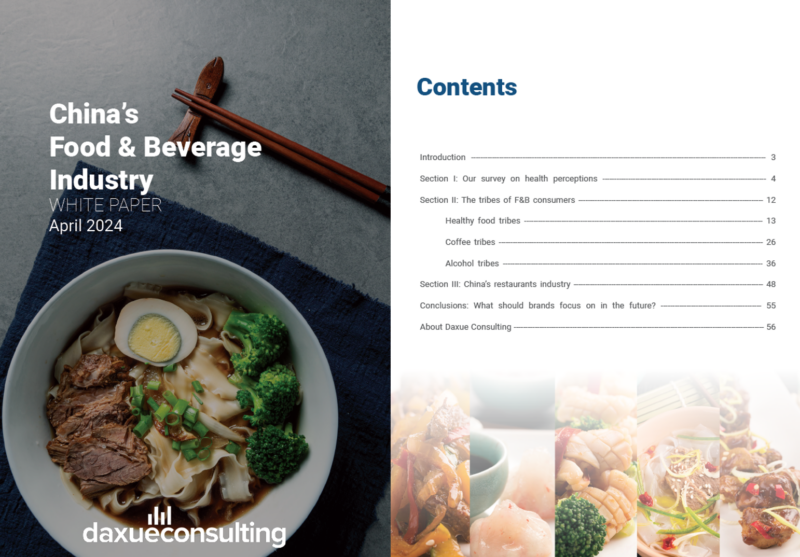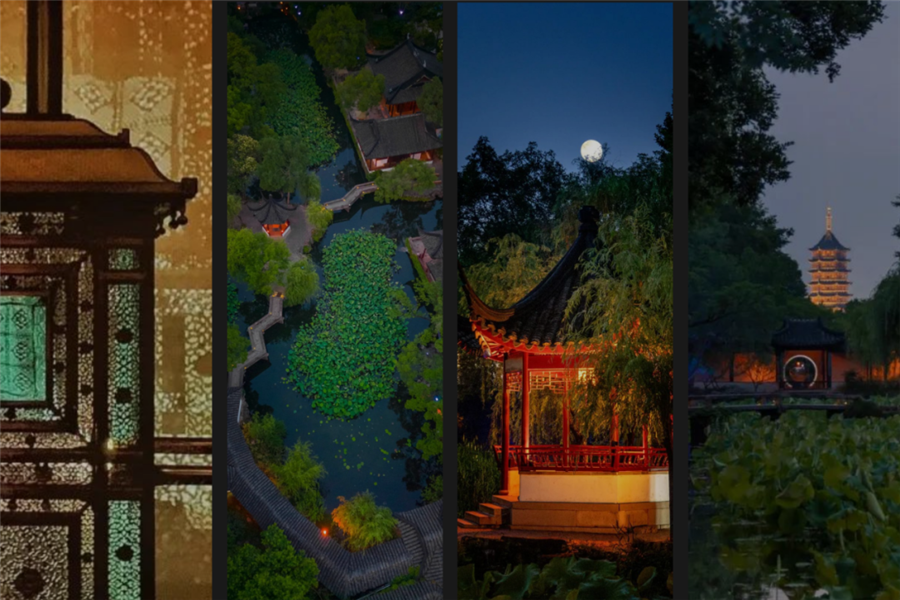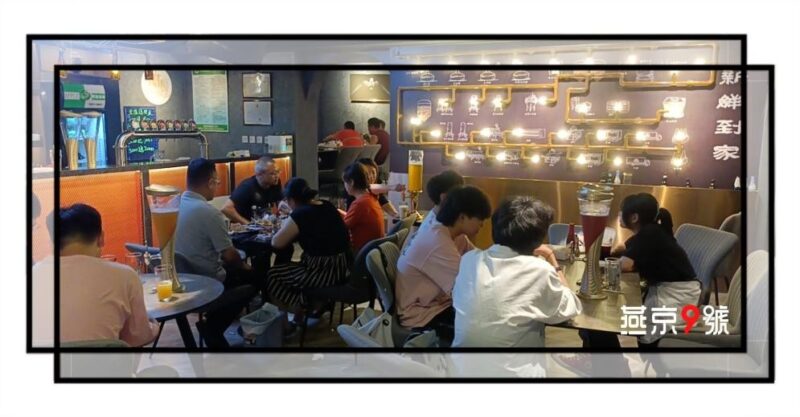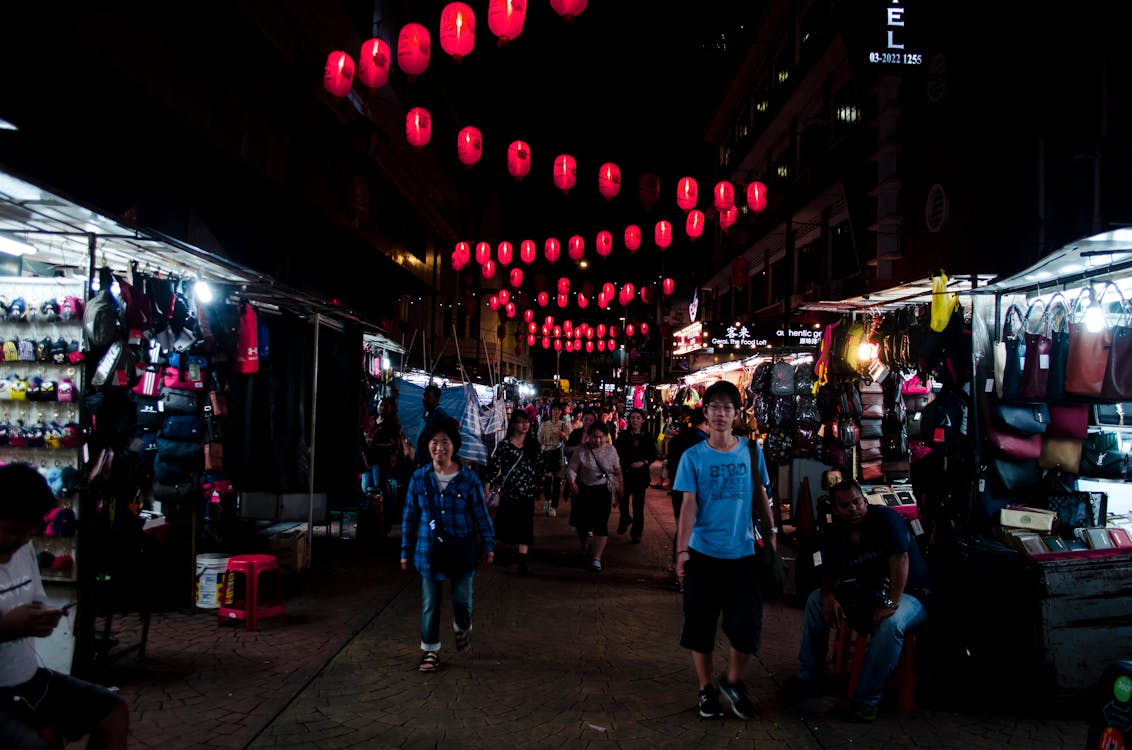China’s nighttime economy is booming as young professionals seek solace and leisure after their demanding “996” work schedules (9 a.m. to 9 p.m., six days a week). With limited free time in the day, nights have become a vital outlet for stress relief and emotional balance. According to the 2023 China Night Economy Development Report by the China Tourism Academy, the market size of China’s night tourism reached RMB 1.57 trillion. The nighttime opening rate of 5A scenic spots reached 56.74%, with 95% of people expressing a willingness to travel at night.
Download our China F&B White Paper

“Mountain city” Chongqing leads China’s booming night economy
China’s nighttime economy has grown rapidly since 2016, with cities such as Chongqing, Shanghai and Changsha leading the way. The “Nightlife Index,” developed by the New First-Tier Cities Research Institute, measures the vitality of urban night economies based on factors such as night travel, the number of bars, live house venues, and public transportation. This index ranked 337 cities, revealing that 17 first- and new-tier cities ranked in the top 20 for nightlife.
Hot pot city Chongqing stands out as a leader in China’s night economy, ranking first in the 2023 Night Economy Development Index by iiMedia Consulting. Despite being the 12th largest city in terms of total economic output, Chongqing’s vibrant nightlife has been driven by strong government support, including collaboration between the Municipal Commerce Committee, the Cultural and Tourism Committee, and the Sports Bureau.
In 2022, six of Chongqing’s consumption districts were recognized as national-level cultural and tourism hubs. Its commercial districts, such as Yuzhong, have been transformed into bustling nightlife centers. The city’s unique topography and landscape contribute to the prosperity. Known as the “mountain city” (山城), Chongqing’s dramatic hills, winding streets, and multi-layered urban spaces create a natural stage for nighttime activities, with stunning views that attract locals and tourists alike. Moreover, its distinct consumer habits, shaped by a culture of social dining and late-night hot pot gatherings, seamlessly align with the growing demand for vibrant night economy offerings. These elements combine to make Chongqing an unparalleled hub for nighttime culture and entertainment.
Night life in China spills over to more industries
The prosperity of nighttime activities has led to a shift from simple night market stalls and food consumption to a rich variety of cultural and entertainment forms, including concerts, art exhibitions, night runs, and night tours.
Bubble tea: the “alcohol” of China
In major cities, 24-hour bubble tea stores have become an integral part of young people’s nightlife. Brands like Heytea (喜茶), Bawangchaji (霸王茶姬), Cha Bai Da (茶百道), Gu Ming (古茗), and Mixuebingcheng (蜜雪冰城) have started offering 24-hour service in some of their stores. After a late night of work or a gathering, consumers often choose milk tea shops as a place to relax. According to Ele.me’s “24-Hour Milk Tea Consumption Report,” among the top ten cities with overnight milk tea stores, 90% are located in the warmer southern region. Only Beijing from the north made the list. A representative from Cha Bai Dao (茶百道) mentioned that many of their 24-hour stores are located in first-tier and emerging first-tier cities, such as Shanghai, Guangzhou, Shenzhen, Hangzhou, and Chengdu.
Chinese-style night tours (中式夜游): spending the night the Chinese way
Chinese-style night tour is another popular nighttime activity. Tourists now seek deep experiences rather than just eating, drinking, and taking photos. Unlike Western night tourism, Chinese nighttime activities blend history, culture, natural scenery, and modern lighting technology to create unique experiences. For example, the Big Wild Goose Pagoda North Square in Xi’an uses light shows, projection technology, and interactive elements to immerse visitors in the cultural atmosphere. Other sites, like the Suzhou Gardens and Longmen Grottoes in Luoyang, have also introduced night tours.
Data from Feizhu shows that during this year’s Mid-Autumn Festival, searches for moon-watching and lantern-viewing activities grew by 61% and 267%, respectively, compared to last year. The “night tour economy” boosts the development of surrounding businesses, including accommodation, dining, exhibitions, photography, and costume rentals, while extending operating hours and creating more opportunities for consumer spending.

Seeking more intimate, smaller bars
Shenzhen and Chengdu are the two cities with the most significant rise in bar numbers. Chengdu surpassed Shanghai in 2019 and continues to maintain its lead. The number of bars in Shenzhen increased by over 70% in 2023 compared to 2017.
Recent trends in the bar industry reveal two major characteristics. First, there’s been a rise in smaller, quieter establishments like taverns and craft beer bars, with more than 70% of new openings in major cities like Beijing, Shanghai, Guangzhou, and Shenzhen fitting this profile. This shift is driven by changing consumer preferences for more intimate, relaxed environments where they can enjoy a drink without the noise and crowds typically associated with larger venues.
There is also more interest in light chain bars. These are smaller, often locally-focused bar chains with a unique, consistent brand and atmosphere that can be easily replicated across multiple locations. Examples include Shanghai’s “Gonglu Store (公路商店)” and Beijing’s “Yanjing Community Bar (燕京社区酒號)”.

The Chinese government supports longer nighttime activity
The Chinese government’s night economy policies have stimulated urban consumption growth through a series of targeted measures. From 2021 to 2023, the central government and major cities introduced 33 relevant policies. Among these, Beijing issued 24 policies, including the “National Night Culture and Tourism Consumption Agglomeration Zone,” which promoted nighttime cultural activities such as light shows and the development of nighttime tourism routes. Chongqing rolled out 20 policies, focusing on extending the operating hours of malls and restaurants, which directly boosted nighttime consumption. Hangzhou’s 7 policies also emphasized the integration of nighttime commerce and cultural events.
Expanding nighttime economy: Maximizing quality time after work
- From 2021 to 2023, the nighttime economy in China grew significantly, with cities like Chongqing, Shanghai, and Chengdu leading. Chongqing ranked first in the 2023 Night Economy Development Index, driven by strong government support and vibrant nightlife initiatives.
- The nighttime economy in China has evolved beyond simple food consumption. It has expanded to a wide range of cultural and entertainment options, such as concerts, art exhibitions, and night tours. Activities like Chinese-style night tours blend history, culture, and modern lighting, offering unique experiences.
- With intense work schedules, many young people in China now seek nighttime activities to relieve stress. Popular choices include late-night milk tea shops and bars. Chengdu, for example, has surpassed Shanghai in the number of bars, reflecting the growing demand for nightlife.
- Between 2021 and 2023, 33 policies were introduced to boost the night economy in cities like Beijing and Chongqing. These policies have focused on extending business hours, improving infrastructure, and promoting cultural tourism to increase nighttime consumption.
- The night tourism sector has seen a boom, with cities offering immersive cultural experiences. Popular destinations like Xi’an and Suzhou have introduced night tours that blend cultural heritage with modern technology, fostering economic growth in surrounding businesses.
We offer consulting services for China’s F&B industry
China’s restaurant market is a dynamic sector, influenced by shifting consumer preferences, technological advancements, and evolving dining habits. Daxue Consulting offers expert market research in China, providing in-depth insights into the trends and challenges shaping the restaurant industry.
Our comprehensive consumer understanding helps businesses refine their offerings and craft effective marketing strategies to resonate with local diners. Through our consulting services, we guide you to leverage emerging opportunities and navigate the competitive landscape. Reach out to us to discover how our expertise can drive your restaurant business’s success in China.






